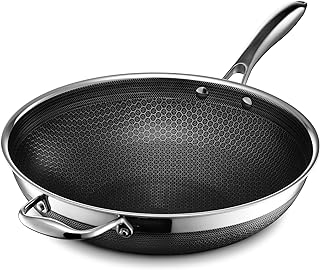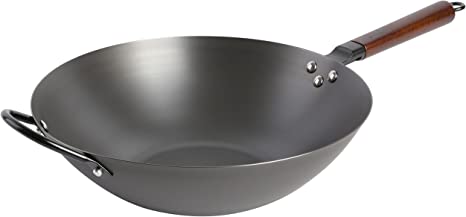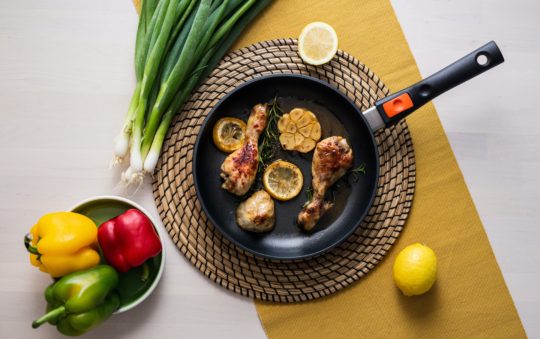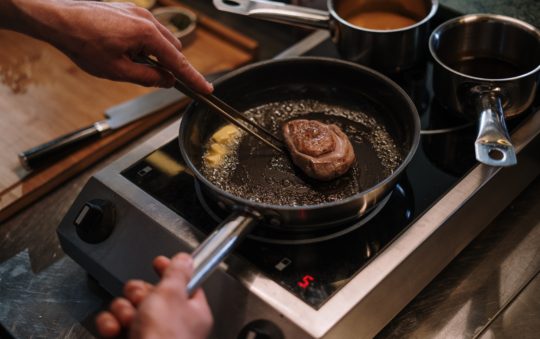Best Oil to Season Wok: Expert Tips for Success

Are you a stir-fry enthusiast? Do you love the high heat and quick cooking that only a wok can provide? Then you probably know the importance of seasoning your wok properly. In this blog, we will dive deep into the world of wok seasoning and explore why it is so crucial. We will discuss the role of patina in creating that perfect non-stick surface, and provide you with a step-by-step guide to seasoning your wok, whether on the stovetop or in the oven. But what really sets this blog apart is our exploration of the science behind oil choice for wok seasoning. We will help you understand the smoke points of different oils and why certain oils, like a cast iron pan, are preferred for seasoning. So if you want to achieve wok perfection, keep reading!
Importance of Seasoning a Wok
Seasoning a wok plays a crucial role in ensuring optimal cooking performance and longevity of the cookware. By creating a non-stick surface, seasoning makes it easier to cook with and clean the wok. Additionally, proper seasoning enhances the flavor of dishes by adding a subtle smoky taste, which adds authenticity to Asian cuisine. Furthermore, seasoned woks distribute heat evenly, resulting in better cooking results. This is especially important when stir-frying or sautéing ingredients. A well-seasoned wok can also withstand high cooking temperatures without corroding or rusting. With its high smoke point, carbon steel woks are the top choice for seasoning, although other oils like olive oil, peanut oil, canola oil, and sunflower oil can be used as well. Overall, the importance of seasoning a wok cannot be overstated as it ensures a protective layer, enhances cooking performance, and adds a delicious touch to your meals.
The Role of Patina in Wok Seasoning
 | HexClad Cookware 14 Inch Wok and Lid with Stay Cool Handles, Hybrid Stainless Steel PFOA-Free Non-Stick Surface |
Seasoning a wok is crucial for achieving a non-stick surface and enhancing the flavors of your dishes. One of the key benefits of seasoning is the formation of a patina, which serves as a protective layer against rust and promotes even heat distribution. When choosing the oil for seasoning, it’s important to opt for one with a high smoke point, such as peanut or vegetable oil. Before starting the seasoning process, ensure that you thoroughly clean and dry the wok to remove any factory coatings or residues. Apply a thin layer of oil to the entire surface of the wok, including the inside, outside, and handle. Heat the wok over medium-high heat until it starts to smoke, then remove it from the heat and allow it to cool. The patina that develops on the seasoned wok serves as a protective coating, preventing corrosion and creating a durable non-stick surface. By following these steps, you can establish a well-seasoned wok that will elevate your stir-fry and sautéing endeavors to new heights.
Step-by-Step Guide to Seasoning Your Wok
To successfully season your wok, follow these simple steps. Start by choosing the right oil for the job. Opt for oils with high smoke points, such as vegetable or canola oil. Before you begin, ensure that your wok is clean and thoroughly dry. Once prepared, heat the wok on high until it starts to smoke. Then, using a paper towel or brush, evenly distribute a thin layer of oil over the entire surface of the wok. Allow the oil to heat until it begins to smoke again. At this point, remove the wok from the heat and let it cool completely. By following these steps, you’ll be well on your way to perfectly seasoned cookware.
Seasoning on a Stovetop Versus in the Oven

When it comes to seasoning a wok, there are two main methods: stovetop and oven. Stovetop seasoning involves heating the wok over high heat and swirling oil to coat the entire surface. On the other hand, oven seasoning requires placing the wok upside down in a preheated oven with a thin layer of oil. Both methods can be effective, but stovetop seasoning is generally quicker and offers better control. To achieve optimal results, it’s important to choose an oil with a high smoke point, such as peanut or vegetable oil. These oils can withstand the high heat required for seasoning without breaking down or becoming rancid. By seasoning your wok using the right method and oil, you can create a non-stick surface and enhance the flavor of your dishes.
The Science Behind Oil Choice for Wok Seasoning
Different oils have varying smoke points, which play a crucial role in the detergent wok seasoning process. It is important to choose an oil with a high smoke point, such as avocado or grapeseed oil, for optimal results. While oils like sesame oil can add flavor to the wok, they may not be ideal for initial seasoning. Consider the type of cooking you will be doing in the wok when selecting an oil for seasoning. Properly heating and applying the oil is vital in achieving a well-seasoned wok. By understanding the science behind oil choice and its impact on the seasoning process, you can ensure that your wok is properly seasoned to enhance your cooking experience.
Understanding Smoke Points of Different Oils
 | HexClad Cookware 14 Inch Wok and Lid with Stay Cool Handles, Hybrid Stainless Steel PFOA-Free Non-Stick Surface |
When it comes to seasoning a wok, understanding the smoke points of different oils is crucial. The smoke point of an oil refers to the temperature at which it begins to break down and produce smoke. To achieve a well-seasoned wok without any unpleasant flavors, it’s important to choose an oil with a high smoke point.
Oils such as avocado oil, peanut oil, and grapeseed oil are excellent choices for wok seasoning. Not only do they have high smoke points, but they also offer a neutral flavor that allows the natural flavors of the food to shine through. On the other hand, it’s best to avoid oils with low smoke points, such as extra virgin olive oil or butter, as they can easily burn and create a sticky residue on the wok.
By selecting oils with high smoke points for wok seasoning, you can ensure that your cooking experience is enjoyable and that your wok remains in top condition for years to come.
Why Certain Oils are Preferred for Wok Seasoning
Different oils have different smoke points, which is crucial for wok seasoning. When it comes to seasoning a wok, oils with high smoke points, like vegetable oil or peanut oil, are preferred. These oils can withstand high heat without burning or leaving a burnt taste. Additionally, they create a non-stick surface on the wok, making it easier to cook with and clean. On the other hand, oils with lower smoke points, such as olive oil or butter, are not recommended for wok seasoning. They have a higher likelihood of burning and can leave a sticky residue on the wok. To ensure successful wok seasoning, it’s best to use oils with high smoke points that can handle the heat without compromising the flavor or performance of the wok.
How to Maintain Your Wok’s Seasoning Over Time
To maintain your wok’s seasoning over time, it is essential to use the right oil. Opt for an oil with a high smoke point, such as vegetable or canola oil, which can withstand the high heat required for wok cooking. When using your wok, remember to preheat it over high heat before adding the oil. This ensures that the oil gets evenly coated on the surface of the wok. Proper seasoning techniques are also important. Apply a thin layer of oil to the entire surface of the wok and heat it until it starts smoking. Repeat this process multiple times to build up a durable seasoning layer. It is crucial to avoid harsh cleaning methods that can strip away the seasoning. Instead, use a soft sponge or cloth to clean your seasoned wok, and avoid using soap or abrasive cleaners. After cleaning, make sure your wok is completely dry before storing it in a cool, dry place to prevent rusting. Over time, the seasoning on your wok may start to wear off. If this happens, simply repeat the seasoning process to restore its non-stick properties.
Can Using the Wrong Oil Ruin Your Wok’s Seasoning?
Using the wrong oil can have a detrimental effect on your wok’s seasoning. Oils with low smoke points, like olive oil, can burn and leave behind a sticky residue. It is recommended to use oils with high smoke points, such as vegetable or canola oil, for the best results. Regularly re-seasoning your wok with the right oil will help maintain its non-stick surface.
Frequently Asked Questions
 | Babish Carbon Steel Flat Bottom Wok and Stir Fry Pan, 14-Inch |
What is the best oil for seasoning carbon steel?
The best oil for seasoning carbon steel is typically one with a high smoke point, such as high smoke point oil, vegetable or grapeseed oil. Avoid oils with low smoke points, like olive oil or butter, to prevent sticky residue. Clean and dry the wok before applying a thin layer of oil to the entire surface using a paper towel or brush.
Conclusion
In conclusion, seasoning your wok is crucial for achieving that perfect non-stick surface and enhancing the flavor of your dishes. The choice of oil plays a significant role in the success of your wok seasoning process. Understanding the smoke points and properties of different oils can help you make an informed decision. While there are various options available, certain oils like peanut oil, grapeseed oil, and flaxseed oil are preferred for their high smoke points and ability to create a durable seasoning layer. Remember to maintain your wok’s seasoning by avoiding harsh cleaning methods and regularly adding a thin layer of oil after each use. Using the wrong oil can potentially ruin your wok’s seasoning, so it’s important to choose wisely. To learn more about the best oils for seasoning your wok and expert tips for success, check out our comprehensive guide.



